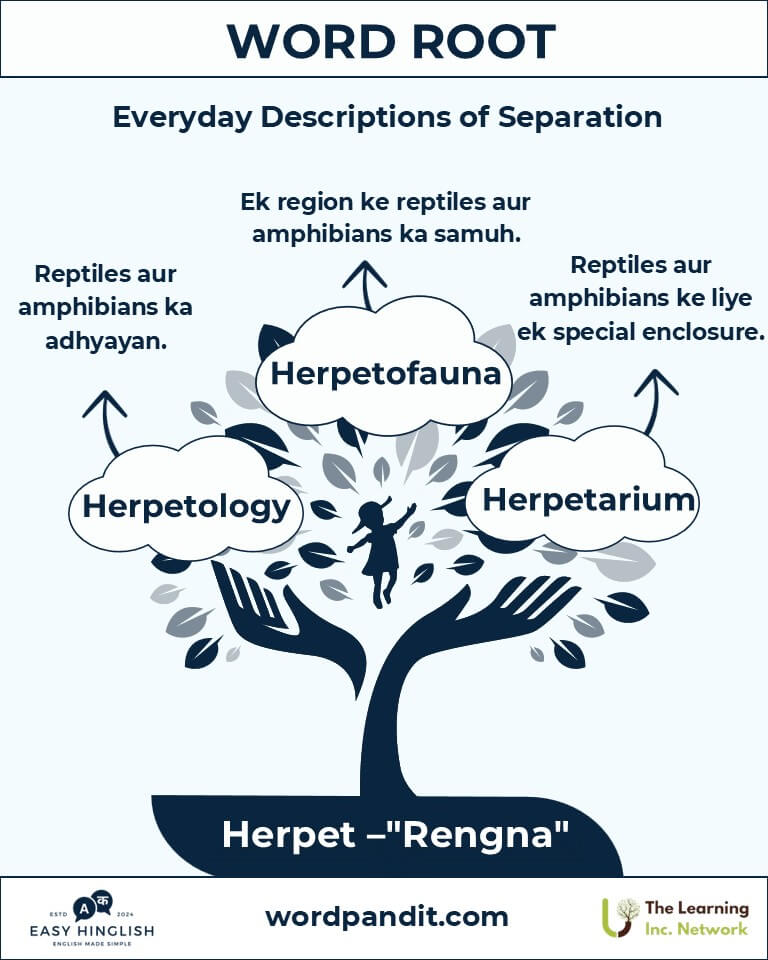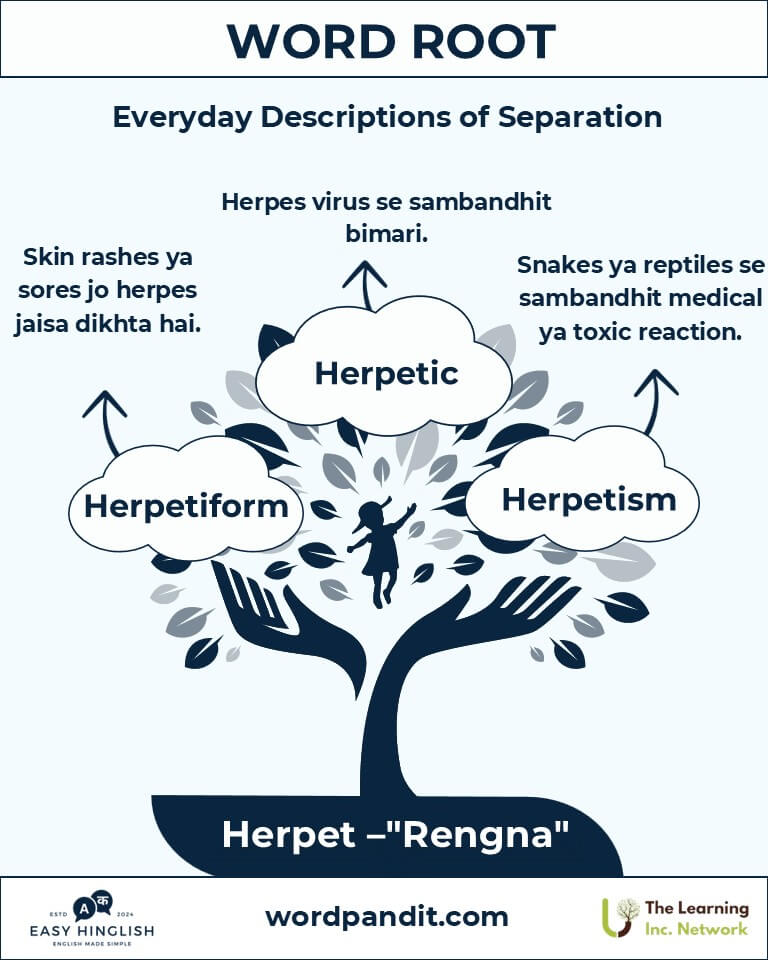Herpet: Exploring the "Creeping" Connection in Language and Science
(Herpet: Language aur Science mein "Creeping" Connection)
Byline: Dive into the fascinating world of the root "herpet," meaning **"creeping."** This root connects us to the scientific study of reptiles and amphibians through terms like **"herpetology,"** as well as other surprising linguistic connections. Discover how this ancient root has **crept** its way into our understanding of **nature and language.**

Table of Contents
- Introduction: The Essence of Herpet
- Etymology and Historical Journey
- Mnemonic: Unlocking the Power of Herpet
- Common Herpet-Related Terms
- Herpet Through Time
- Herpet in Specialized Fields
- Illustrative Story: Herpet in Action
- Cultural Significance of the Herpet Root
- The Herpet Family Tree
- FAQs About the Herpet Word Root
- Test Your Knowledge: Herpet Mastery Quiz
- Conclusion: The Living Legacy of Herpet
1. Introduction: The Essence of Herpet
(Herpet ka Mool Arth - Herpet का मूल अर्थ)
The **"Herpet"** root originates from the Greek word **herpein,** meaning **"to creep"** (धीरे-धीरे रेंगना). This root describes the **crawling movement** of reptiles and amphibians, leading to its use in terms like **herpetology** (the study of reptiles and amphibians) and **herpes** (a creeping skin disease). From **daily life to medical science,** "herpet" symbolizes **motion and persistence (स्थिरता).**

2. Etymology and Historical Journey
(Herpet ki Utpatti aur Itihaas - Herpet की उत्पत्ति और इतिहास)
The root **"Herpet"** derives from the Greek verb **herpein,** which describes **slow, creeping movement.** Ancient Greek naturalists used this term for **reptiles and amphibians,** which move by **crawling or slithering.** By the medieval period, the term evolved into **"herpes"** in Latin, referring to a **creeping skin disease.** By the **19th century,** "herpetology" became a **scientific discipline** in biology, defining **Herpet's** key role in language and science.
3. Mnemonic: Unlocking the Power of Herpet
(Mnemonic ke Zariye Herpet ko Yaad Rakhein - Mnemonic के ज़रिए Herpet को याद रखें)
Imagine a **small gecko** silently creeping on a **branch under the moonlight.** Its **deliberate motion perfectly** captures the essence of **"herpet."**
Mnemonic Device: "Herpet holds the secret to creatures that crawl, creep, and slither across nature's canvas."
4. Common Herpet-Related Terms
(Herpet-se Jude Common Words aur Unka Arth - Herpet से जुड़े आम शब्द और उनके अर्थ)
- Herpetology (hur-puh-TOL-uh-jee):
Definition: The branch of study focused on **reptiles and amphibians.**
Example: "Herpetology reveals the ecological role of amphibians in wetland ecosystems." - Herpetologist (hur-puh-TOL-uh-jist):
Definition: A scientist who studies **reptiles and amphibians.**
Example: "The herpetologist closely observed the chameleon's movements." - Herpes (HUR-peez):
Definition: A group of **viral diseases** known for their **creeping spread.**
Example: "The herpes simplex virus can remain dormant in nerve cells for years." - Herpetofauna (hur-puh-toh-FAW-nuh):
Definition: The **collective group of reptiles and amphibians** in a particular region.
Example: "The Amazon rainforest has a rich diversity of herpetofauna." - Herpetarium (hur-puh-TAR-ee-um):
Definition: A **facility or enclosure** designed for **housing reptiles and amphibians.**
Example: "The zoo's herpetarium features rare snakes and lizards."
5. Herpet Through Time
(Samay ke Saath Herpet ka Safar - समय के साथ Herpet का सफर)
- Herpes (Ancient Use): Ancient medical texts described **herpes** as a disease that **creeps over the skin.**
- Shift in Use: With advancements in virology, **herpes** became specifically associated with **viral infections.**
- Herpetology (Modern Use): In the **19th century,** "herpetology" was formally recognized as the **scientific study of reptiles and amphibians.**
- Impact: Herpetology has led to **major discoveries in biodiversity, ecology, and conservation.**
6. Herpet in Specialized Fields
(Vishesh Kshetron Mein Herpet ka Mahatva - विशेष क्षेत्रों में Herpet का महत्व)
- Medicine (चिकित्सा):
- Herpes simplex: A **viral infection** that spreads through **creeping lesions.**
- Zoology (जीव विज्ञान):
- Herpetofauna: Refers to a region's **reptiles and amphibians.**
- Ecology (पारिस्थितिकी):
- Conservation efforts: Focus on **protecting herpetofauna habitats.**
7. Illustrative Story: Herpet in Action
(Herpet ki Ek Prerak Kahani - Herpet की एक प्रेरक कहानी)
Dr. Elena Martinez, a **renowned herpetologist,** was researching **herpetofauna** in the **rainforests of Costa Rica.** One evening, she spotted a **rare golden toad,** a species believed to be **extinct.** Its **slow and deliberate movement** was a perfect example of **"herpet"**—symbolizing **nature's persistence and resilience.** Her discovery led to a **global conservation movement,** proving that **language, science, and nature** are deeply connected.
8. Cultural Significance of the Herpet Root
(Herpet Root ka Sanskritik Mahatva - Herpet Root का सांस्कृतिक महत्व)
The **Herpet root** forms a **bridge between science and culture.** In **ancient medicine,** it described the **creeping nature of diseases.** In **modern zoology,** it highlights **biodiversity** and the **importance of reptiles and amphibians** in **ecosystems.**

9. The Herpet Family Tree
(Herpet Family ke Related Words - Herpet Family के संबंधित शब्द)
- Rept- (Latin: crawling, creeping):
- Example: *Reptile*—a creeping animal.
- Trep- (Greek: turning, creeping):
- Example: *Trepidation*—nervous movement or fear.
- Derm- (Greek: skin):
- Example: *Dermatology*—the study of the skin.
- Virus (Latin: poison):
- Example: *Viral infections,* including **herpes simplex.**

10.FAQs About the Herpet Word Root
Q: Herpet root ka kya matlab hai?
A: Herpet root Greek word "herpein" se aaya hai, jiska matlab hai "to creep" (धीरे-धीरे रेंगना). Yeh root reptiles aur amphibians ke crawling ya slithering movement ko describe karta hai aur creeping skin conditions jaise herpes se bhi juda hai.
Q: Herpetology kya hai?
A: Herpetology reptiles aur amphibians ki study ka branch hai. Isme snakes (सांप), lizards (छिपकली), turtles (कछुए), frogs (मेंढक), aur salamanders (सलामैंडर) ki study hoti hai. Herpet root se inspired yeh field biodiversity aur ecological importance ko samajhne mein help karti hai.
Q: Herpes ka naam Herpet root par kyun rakha gaya?
A: Herpes root "herpet" se derived hai, kyunki herpes virus se hone waale sores (घाव) ya lesions (फफोले) skin par "creep" karte hain ya dheere-dheere failte hain.
Q: Herpetofauna kya hai?
A: Herpetofauna ek region ke reptiles aur amphibians ko collectively refer karta hai. Yeh term un creeping animals ki ecological importance ko emphasize karta hai.
Q: Herpetarium ka matlab kya hai?
A: Herpetarium ek special facility ya enclosure hai jisme reptiles aur amphibians ko rakha aur study kiya jata hai. Zoos aur research centers mein yeh kaafi common hote hain.
Q: Zoology aur medicine ke bahar Herpet root ka use hota hai?
A: Mostly, Herpet ka use scientific aur medical fields tak seemit hai. Lekin iska impact creeping movement aur gradual progress dikhane waale terms mein dekhne ko milta hai.
Q: Reptiles aur amphibians ka Herpet root se kya connection hai?
A: Dono groups creeping ya crawling locomotion (गति) dikhate hain, jo Herpet root ke meaning se align karta hai. Isi wajah se reptiles aur amphibians ko herpetology ke under study kiya jata hai.
11.Test Your Knowledge: Herpet Mastery Quiz
1. Herpet root ka matlab kya hota hai?
2. Herpetologist kya study karta hai?
3. Herpetofauna kis group ko refer karta hai?
4. Herpes ka Herpet root se connection kyun hai?
5. Herpetarium kya hota hai?
12. Conclusion: The Living Legacy of Herpet
(Herpet ki Jeevant Virasat - Herpet की जीवंत विरासत)
The **Herpet root** reminds us of the **intricate connections** between **nature and language.** From the **graceful movement** of **reptiles and amphibians** to the **creeping nature of diseases,** this root continues to shape **science and communication.**








